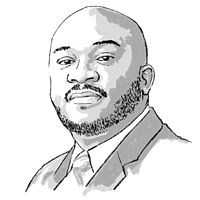Why one Black mayor sees an American ‘apartheid’
Loading...
Chokwe Lumumba. It is a name of imagination, as much as it is a name of determination.
When the former Edwin Finley Taliaferro took on the name in 1969, he did so to honor the liberation-minded Chokwe people of Central Africa, along with the late Patrice Lumumba, the first prime minister of the Democratic Republic of Congo.
It was a name he passed down to his son, who, like his father, eventually became the mayor of Jackson, Mississippi, many miles away from the heart of Africa. And yet, the legacy of political imagination and Black self-determination remained. So when the name of Lumumba issues the charge of “apartheid,” it does not ring hollow.
Why We Wrote This
A story focused onIn the conversation about racial justice, the need for self-determination – the freedom of Black Americans to shape their own destinies – is sometimes overshadowed. But news in Tennessee and Mississippi has brought it to the fore.
“They are looking to colonize Jackson,” the younger Mr. Lumumba said in January after Mississippi’s state government proposed a host of controversial bills. “Not only in terms of putting their military force over Jackson but also dictating who has province over decision-making.
“It reminds me of apartheid.”
We largely view the segregationist culture of “apartness” through the 50 years of legislated minority rule in South Africa. The behaviors of state governments, such as those in Mississippi and – more recently – Tennessee, are functions of majority rule. The common thread between the two is the actions and attitudes of white supremacy, which denies determination and destiny for Black people and profoundly punishes Black resistance.
When two Black Democrats, state Reps. Justin Jones and Justin Pearson, were expelled from the Tennessee state House after an unsanctioned gun control protest in the heart of the chamber, the white supermajority asserted its power. Amid protests, both have now been reinstated, pending special elections.
But a third Democrat who protested alongside the men, Rep. Gloria Johnson, was not dismissed. She shared her reasoning for being spared expulsion with CNN.
“I am a 60-year-old white woman, and they are two young Black men,” Ms. Johnson said.
Her explanation provides context for understanding the bills in Mississippi. They concern Jackson’s chronic water crisis and local policing.
One bill seeks to transfer Jackson’s water system to a state-appointed, nine-member board. Another bill would create a separate judicial district around Jackson, where judges would be appointed by the chief justice of the Mississippi Supreme Court, and prosecutors would be appointed by the attorney general. The second bill would also expand the zone patrolled by a special police force that protects state buildings.
“They’re talking about a court system in which the judges would not be elected by Jackson residents, and a police force that has no accountability,” Mr. Lumumba said.
In short, a city that is more than 80% Black is seeing its agency and authority dramatically stripped away by white state lawmakers.
So often, our societies today talk about the history of slavery and colonization worldwide, or of the struggle for civil rights in this country. But less discussed, and perhaps more important, is how Black people view self-determination – the ability to shape our own futures – and how often governments have pushed back against such a fundamental notion.
The former Mr. Taliaferro changed his name after he joined the Republic of New Afrika, a Black nationalist and separatist organization. Its goal was to “Free the land!” Specifically, the RNA sought to carve out a separate Black nation from the states of Louisiana, Alabama, Mississippi, Georgia, and South Carolina, along with reparations payments of $10,000 for every Black person. Fifty-five years ago this March, the RNA met in Detroit at the Black Government Conference, where they signed a new declaration of independence.
In 1971, police raided the RNA’s headquarters in Jackson. Many RNA members were arrested and incarcerated as political prisoners.
I think about the members of the RNA, about Representatives Jones and Pearson, about constituents and countless others, and how many of us are casualties of the clash between Black self-determination and suppression – casualties of government, both figuratively and literally. Debates about gun control – even heated ones – should not turn into dismissals.
It reminds me of the prophetic words of Patrice Lumumba regarding decency and democracy: “Without dignity there is no liberty, without justice there is no dignity, and without independence there are no free men.”
What does the absence of such ideals look like? Mass incarceration, communities controlled by violence, and the denial of basic human rights. Life, liberty, and the pursuit of happiness have always been the promise to those for whom the state was made. But too often the result has been the maintenance of white power, leaving the Black path to the promise of self-determination with one great opponent.
The status quo.








